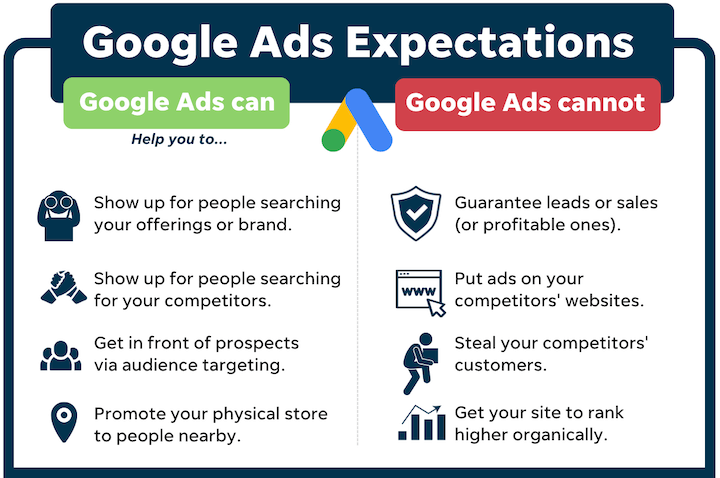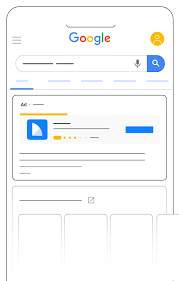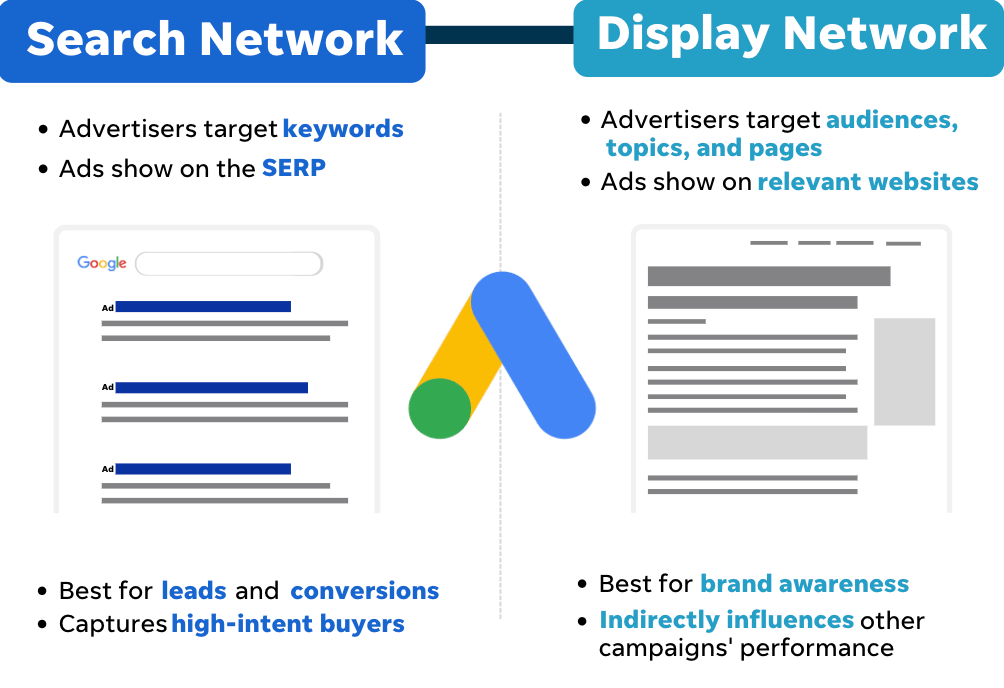Intro
As the world becomes increasingly digital, businesses of all sizes are realizing the importance of having a strong online presence. One of the most effective ways to boost your visibility and reach your target audience is through Google Search Ads. In this comprehensive beginner’s guide, we will explore the ins and outs of Google Search Ads and how they can help you enhance your online presence.
How Google Search Ads Work
Google Search Ads are a form of online advertising that appears at the top or bottom of the search engine results page (SERP) where your ads appear when users search for specific keywords. The ads are designed to attract potential customers to your website by triggering relevant search queries. When someone clicks on your ad, you pay a certain amount based on the bidding system, known as the pay-per-click (PPC) model.
To create a Google Search Ad, you need to select the keywords that are relevant to your business and target audience. When a user searches for those keywords, your ad has the potential to appear. However, it’s important to note that the highest bidder does not solely determine ad placement. Google also considers the quality and relevance of your ad, as well as the user’s search intent.
Benefits of Using Google Search Ads
Google Search Ads offer numerous benefits for businesses looking to boost their online presence. One of the biggest advantages is the ability to reach a highly targeted audience. Google Search Ads allow you to select specific keywords and demographics to ensure that your ads are shown to the right people at the right time, unlike traditional forms of advertising, where you have limited control over who sees your message.
Another benefit of Google Search Ads is their flexibility and scalability. You have full control over your ad campaigns and can easily make changes to optimize their performance. Whether you want to increase your budget, modify your ad copy, or adjust your bidding strategy, you can do so with just a few clicks.
Additionally, Google Search Ads provide valuable insights and data that can help you measure the success of your campaigns. You can track metrics such as click-through rate (CTR), conversion rate, and return on investment (ROI) to understand how your ads are performing and make informed decisions to improve their effectiveness.

Understanding Keywords and Search Intent
Keywords play a crucial role in the success of your Google Search Ads campaigns. They are the words or phrases that users type into the search engine when looking for information, products, or services. By targeting the right keywords, you can increase the chances of your ads appearing to users who are actively searching for what you have to offer.
When selecting keywords for your Google Search Ads, it’s important to consider the search intent of your target audience. Search intent refers to the motivation behind a user’s search query. Are they looking for information, seeking to make a purchase, or comparing different options? By understanding the intent behind the keywords, you choose, you can create more relevant and compelling ads that resonate with your audience.
There are different types of keywords that you can target with Google Search Ads. You can use broad-match keywords to reach a wider audience, but your ads may appear for irrelevant search terms. You can use exact-match keywords to ensure that your ads are only shown when people search for your exact keywords. Phrase match and modified broad match keywords offer a balance between broad reach and specificity.
Creating Effective Ad Campaigns
To create effective Google Search Ad campaigns, it’s important to have a clear understanding of your goals and target audience. Start by defining your objectives. Are you looking to increase website traffic, generate leads, or boost sales? Once you have a clear goal in mind, you can tailor your ad campaigns to achieve those objectives.
Next, consider your target audience. Who are they, and what are their needs and preferences? By understanding your audience, you can create an ad copy that speaks directly to their pain points and offers solutions. Use language that resonates with your target market and highlights the unique benefits of your products or services.
In addition to compelling ad copy, the design and layout of your ads also play a crucial role in their effectiveness. Use eye-catching visuals, such as high-quality images or videos, to capture the attention of your audience. Ensure that your ads are visually appealing and consistent with your brand identity.
Setting Up Your Google Ads Account
Before you can start running Google Search Ads, you need to set up a Google Ads account. The process is relatively straightforward and involves a few simple steps. First, visit the Google Ads website and click on the “Start Now” button. You will be prompted to sign in with your Google account or create a new one if you don’t have an existing account.
Once you’re signed in, you’ll need to provide some basic information about your business, such as your website URL and location. You’ll also have the option to link your Google Ads account to your Google Analytics account, which can provide additional insights and data about your website’s performance.
After completing the initial setup, you can start creating your first ad campaign. Google Ads provides a user-friendly interface that allows you to easily navigate through the various settings and options. Take your time to familiarize yourself with the platform and explore the different features available to optimize your ad campaigns.
Keyword Research for Google Search Ads
Keyword research is a crucial step in the success of your Google Search Ads campaigns. It involves identifying the keywords that are most relevant to your business and have the highest potential to reach your target audience. By selecting the right keywords, you can increase the visibility of your ads and attract qualified traffic to your website.
Start by brainstorming a list of keywords that are directly related to your products, services, or industry. Put yourself in the shoes of your target audience and think about the words or phrases they would use when searching for what you offer. You can also use keyword research tools, such as Google Keyword Planner or SEMrush, to discover new keyword ideas and analyze their search volume and competition.
Once you have a list of potential keywords, it’s important to evaluate their relevance and search volume. Look for keywords that have a high search volume and are closely related to your business. Avoid targeting overly broad keywords that may attract irrelevant traffic or highly competitive keywords that may be difficult to rank for.
For comprehensive information in this field, we suggest the following post:
Writing Compelling Ad Copy
The success of your Google Search Ads largely depends on the quality of your ad copy. Your ad copy is what captures the attention of your audience and entices them to click on your ad. To write a compelling ad copy, you need to understand your target audience and their needs and craft a message that resonates with them.
Start by focusing on the headline of your ad. The headline is the first thing that users see, so it needs to be attention-grabbing and compelling. Use strong, action-oriented language and highlight the unique benefits of your products or services. Consider using keywords in your headline to increase the relevance of your ad.
In the body of your ad, expand on the main benefits or features of your offering. Use persuasive language and provide specific details and examples to demonstrate why your product or service is the best choice for your audience. Include a call-to-action (CTA) that tells users what action you want them to take, such as “Shop Now,” “Learn More,” or “Sign Up.”
Bid Strategies and Budgeting for Google Search Ads
When running Google Search Ads, you need to consider your bid strategy and budget to ensure that your ads are cost-effective and deliver the desired results. Bid strategy refers to how you want Google to optimize your bids to achieve your goals. There are several bid strategies available, including manual bidding, automated bidding, and enhanced CPC bidding.
Manual bidding allows you to set your bids manually for greater control over your ad spend. Automated bidding, on the other hand, lets Google automatically adjust your bids based on your goals, such as maximizing clicks or conversions. Enhanced CPC bidding combines manual bidding with automated adjustments to optimize your bids for better performance.
In addition to bid strategy, you also need to set a budget for your Google Search Ads campaigns. Your budget determines how much you’re willing to spend on your ads on a daily or monthly basis. It’s important to set a budget that aligns with your overall marketing goals and ensures that you don’t overspend. Monitor your ad spending regularly and make adjustments as needed to optimize your budget.
Tracking and Measuring the Success of Your Google Search Ads
To determine the success of your Google Search Ads campaigns, you need to track and measure key metrics. By analyzing these metrics, you can gain valuable insights into the performance of your ads and make data-driven decisions to optimize their effectiveness.
One of the most important metrics to track is the click-through rate (CTR), which measures the percentage of users who click on your ad after seeing it. A high CTR indicates that your ad is relevant and compelling to your target audience. Other important metrics include conversion rate, which measures the percentage of users who complete a desired action, and return on investment (ROI), which measures the profitability of your ad campaigns.
Google Ads provides a variety of tools and reports to help you track and measure the success of your Google Search Ads campaigns. The Google Ads dashboard provides an overview of your campaign performance, while the Reports tab allows you to generate more detailed reports based on your specific goals and metrics. Use these tools to regularly monitor the performance of your ads and make adjustments as needed.
Tips for Optimizing Your Google Search Ads
Optimizing your Google Search Ads is an ongoing process that involves testing, analyzing, and refining your campaigns to improve their performance. Here are some tips to help you optimize your Google Search Ads and maximize their effectiveness:
Continuously monitor and analyze your ad performance
Regularly review your metrics and identify areas for improvement. Experiment with different ad copy, keywords, and bidding strategies to see what works best for your business.
Conduct A/B testing
Create multiple variations of your ads and test them against each other to see which one performs better. Test different headlines, ad copy, and visuals to identify the most effective combinations.
Optimize your landing pages
Ensure that your landing pages are relevant to your ads and provide a seamless user experience. Use clear and compelling calls to action to guide users toward the desired action
Refine your keyword targeting
Regularly review and update your keyword list to ensure that you’re targeting the most relevant and high-performing keywords. Remove keywords that are not driving results and add new ones that align with your business objectives.
Leverage ad extensions
Ad extensions allow you to provide additional information and links in your ads, making them more informative and engaging. Use ad extensions such as site link extensions, call extensions, and location extensions to enhance the visibility and effectiveness of your ads.
For comprehensive information in this field, we suggest the following post:
Common Mistakes to Avoid in Google Search Ads
While Google Search Ads can be highly effective, there are some common mistakes that advertisers often make. By avoiding these mistakes, you can maximize the performance of your Google Search Ads campaigns:
Poor keyword selection
Choosing irrelevant or overly broad keywords can result in wasted ad spend and low conversion rates. Take the time to research and select keywords that are highly relevant to your business and have a high search volume.
Lack of ad testing and optimization
Failing to test and optimize your ads can limit their effectiveness. A/B test different variations of your ads to identify the best-performing options and make data-driven decisions to improve their performance
Ignoring search intent
Understanding the search intent of your target audience is crucial for creating relevant and compelling ads. Tailor your ad copy to match the user’s search intent and offer solutions to their specific needs.
Neglecting landing page optimization
Your ads may attract clicks, but if your landing pages are not optimized, users may leave without taking the desired action. Ensure that your landing pages are relevant, user-friendly, and designed to convert.
Failing to track and measure key metrics
Without proper tracking and measurement, it’s difficult to gauge the success of your ad campaigns. Set up conversion tracking and regularly analyze your metrics to make data-driven decisions.
The Future of Google Search Ads
As technology continues to evolve, so do Google Search Ads. Google is constantly introducing new features and improvements to enhance the effectiveness of its advertising platform. In recent years, we have seen advancements in machine learning, automation, and audience targeting, which have made it easier for advertisers to reach their target audience and achieve their marketing goals.
Looking ahead, we can expect Google Search Ads to become even more personalized and dynamic. Advertisers will have access to more advanced targeting options, allowing them to reach highly specific segments of their audience. Machine learning algorithms will continue to optimize bidding strategies and ad placements, ensuring that ads are shown to the most relevant users at the right time.
Furthermore, as voice search and mobile usage continue to rise, Google Search Ads will need to adapt to these changing trends. Advertisers will need to optimize their campaigns for voice queries and ensure that their ads are mobile-friendly to provide a seamless user experience across different devices.
conclusion
In conclusion, Google Search Ads offer a powerful tool for enhancing your online presence and reaching your target audience. By understanding how Google Search Ads work, conducting thorough keyword research, and creating compelling ad campaigns, you can maximize the effectiveness of your online advertising efforts. Remember to track and measure key metrics, regularly optimize your ads, and stay up to date with the latest trends and advancements in Google Search Ads to stay ahead of the competition.
Is managing Google ads complicated and difficult for you? Don’t worry, we’re here to help you with all your Google Ads campaign creation and management needs. Contact us today to learn how we can assist you in boosting your online presence with Google Search Ads.




